Exploring the Best Pet Birds in India
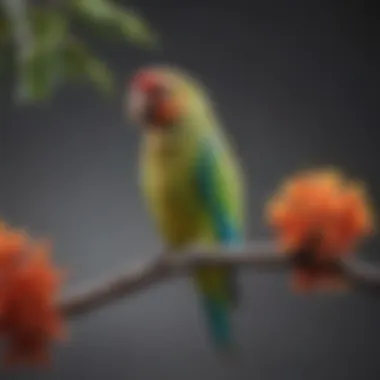
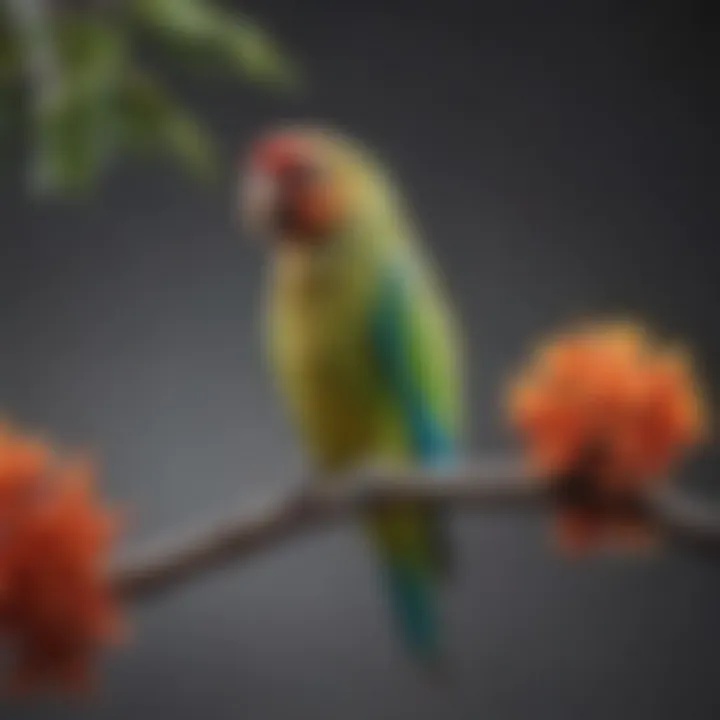
Intro
In recent years, the trend of keeping pet birds has gained significant popularity across India. The charming qualities of these avian companions can create a vibrant atmosphere in homes. However, selecting the right species requires more than just an appreciation of their aesthetics. Factors such as care requirements, dietary preferences, and the bird's behavior all play crucial roles in ensuring a happy household for both birds and their owners.
Bird enthusiasts may find themselves overwhelmed by the numerous species available. Each bird has unique traits and needs. Understanding these traits helps in making informed decisions. Moreover, prospective bird owners should comprehend the responsibilities involved in caring for these creatures.
It's essential to provide adequate information about different species and their compatibility with domestic settings. This article aims to be a comprehensive guide, focusing on care tips, behavioral insights, nutrition guides, wellness, and enriching activities tailored for various bird species prevalent in India. By deepening this understanding, we hope to encourage better practices in pet bird ownership, contributing to the overall well-being of these extraordinary creatures.
Intro to Pet Birds
Understanding pet birds is essential for anyone considering these creatures as companions. Birds have increasingly become popular pets across various cultures, including India. This section serves as an introduction to the fascinating world of pet birds, highlighting the importance of proper care and knowledge for potential bird owners.
The Popularity of Birds as Pets
Pet birds are gaining traction in India for several reasons. The unique attributes of birds, including their captivating colors and charming vocalizations, attract many people. Moreover, unlike dogs or cats, birds require less space and can adapt to smaller living conditions. Their social nature and ability to bond with humans make them appealing companions.
Birds have also become symbols of freedom and beauty. Families and individuals are drawn to their lively presence and intelligence. In recent years, the accessibility of various species and dedicated avian communities has further fueled this interest. As more people seek suitable pets, birds emerge as an attractive option.
Advantages of Owning Pet Birds
Owning a pet bird can bring several advantages, both emotionally and practically. Here are some reasons potential bird owners should consider:
- Low Maintenance: Many bird species are relatively low-maintenance when compared to larger pets. Basic needs often include a suitable cage, fresh food, and social interaction.
- Social Interaction: Birds can be social creatures, often becoming bonded to their owners. This connection can provide unique joys and emotional support.
- Educational Opportunities: Birds present a chance for learning about different species, behavior, and care needs, fostering an environment of curiosity and respect for wildlife.
- Minimal Space Requirement: Birds can thrive in more compact living spaces, making them suitable for urban dwellers.
Overall, the advantages of owning pet birds encompass emotional fulfillment and practical considerations, contributing to their growing popularity in households across India.
Top Pet Bird Species in India
The selection of pet bird species in India is both diverse and captivating. This variety plays a crucial role in educating potential bird owners about which species might be the best fit for their lifestyle and environment. Understanding the unique traits and care requirements of different birds helps in making informed decisions. Each species has specific needs regarding housing, social interaction, and diet. Moreover, familiarity with their behaviors can enhance the bond between the caretaker and the bird.
Parakeets
Parakeets are among the most popular pet birds in India. Their vibrant colors and sociable nature make them appealing to many. They adapt well to home environments and have relatively manageable care requirements, which is vital for first-time bird owners.
Budgerigar
The Budgerigar, commonly known as a budgie, is one of the tiniest yet most enchanting birds that individuals can choose as a pet. Known for their playful demeanor, budgies are excellent companions. Their social nature allows them to bond closely with their owners. A key characteristic of budgies is their ability to mimic sounds and speech, which can be quite entertaining.
One unique feature is their wide range of colors and patterns. This variety makes them visually appealing to many bird lovers. However, budgies do require social interaction; otherwise, they may become bored and anxious. Overall, the Budgerigar is a beneficial choice for those who seek a lively and interactive pet.
Rose-ringed Parakeet
The Rose-ringed Parakeet, also known as the Indian Ringneck, is another fascinating species. Their striking green plumage is instantly recognizable, often paired with a prominent ring around their necks. This species contributes a unique charm to any household.
The Rose-ringed Parakeet is known for its intelligence and ability to mimic speech. As a pet, this characteristic can be engaging for owners. However, they require a bit more attention and stimulation than smaller parakeets. They thrive in environments where they can interact with humans regularly. Despite the higher care demands, their engaging personality and intelligence make them a popular choice for avid bird enthusiasts.
Canaries
Canaries are celebrated for their singing abilities. These small birds come in various colors, each bringing its own charm to the home. Their varied songs captivate many and make them a sought-after choice for bird lovers.
Singer Canary
The Singer Canary is particularly appreciated for its melodic tones. They have a unique ability to produce complex vocalizations, which many owners find delightful. The singing ability of these canaries makes them a popular choice among individuals looking to enjoy the soothing sounds of nature indoors.
However, one disadvantage is that they can be sensitive to their environment. If they are stressed, their singing may diminish. Nonetheless, their musical talent is a major draw for many new bird owners.
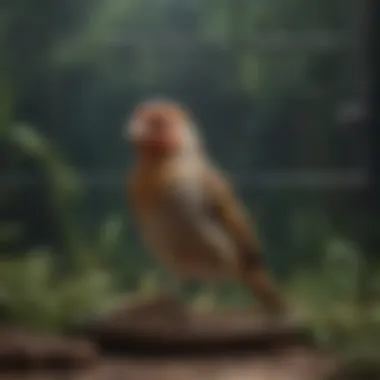
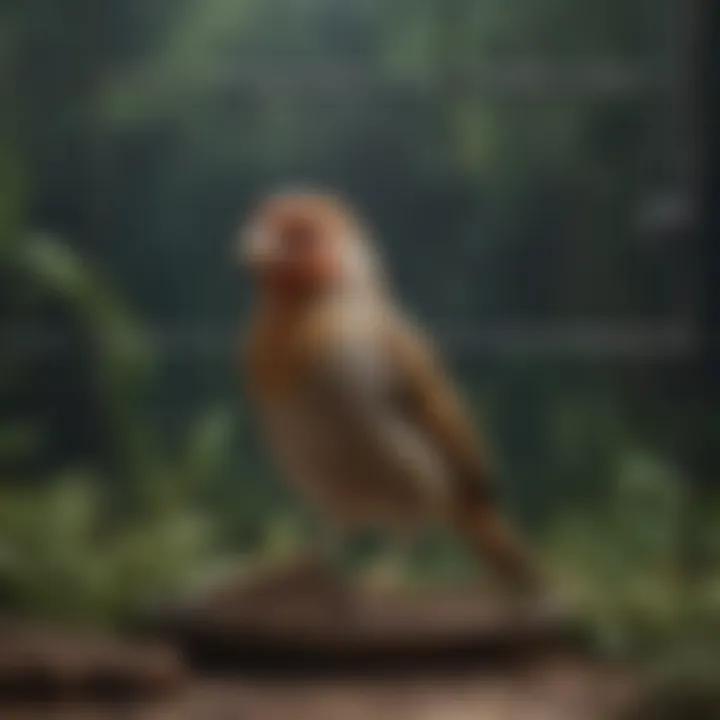
Color-bred Canary
The Color-bred Canary is a marvel of aviculture. Known for their stunning hues, these birds capture attention with their vivid colors. This species contributes greatly to the aesthetic aspect of bird ownership.
The unique feature of Color-bred Canaries is their wide range of color variations, produced through selective breeding. While they may not match the Singers in vocal prowess, their vibrant appearances often make up for that. Owners should be aware of proper breeding practices, as it can impact the bird's health and temperament. Thus, ensuring ethical sourcing is crucial when considering this species.
Cockatiels
Cockatiels are medium-sized birds known for their friendly nature. They are often recognized by their crest and make excellent pets for individuals and families. Their pleasant demeanor can lighten the mood in a household.
Cockatiels are relatively easy to care for, but they do thrive on interaction. They can learn to whistle tunes and even mimic simple phrases, which adds to their charm. Their adaptability to various living conditions makes them suitable for many households. However, owners need to provide them sufficient time outside the cage for socialization and exercise.
Lovebirds
Lovebirds are small and affectionate creatures that build strong bonds with their owners. Known for their curious and active personalities, they can make lively companions. Their interactive nature often leads to engaging play and interaction.
However, lovebirds thrive best in pairs or groups. A solitary lovebird may experience loneliness, which could lead to behavioral issues. Owners must consider whether they can commit to having multiple birds or providing ample social interaction for a single lovebird.
Finches
Finches are diverse in species, making them intriguing to bird owners. Their melodious chirps and social behaviors contribute to a lively atmosphere in any home.
Zebra Finch
The Zebra Finch is one of the most popular finch species in homes. Their striking patterns and cheerful song are a delight. Known for their resilience, they adapt well to various living conditions and require minimal handling.
One key characteristic of Zebra Finches is their social nature. They do best in groups, which brings out their playful behavior. On the downside, they can become territorial if not housed properly. Nevertheless, their easygoing traits make them beneficial for those seeking low-maintenance companions.
Society Finch
The Society Finch is another friendly species that exhibits a gentle demeanor. They are social birds that thrive in community settings, often seen interacting with each other in harmony. They do not require extensive care, making them accessible options for beginners.
One unique feature of Society Finches is their strong communal behavior. They tend to bond well with others, making them ideal for those who wish to enjoy the company of multiple pets in one housing setup. Being less vocal than other finches, they might not be the best choice for those seeking songbirds. However, their social attributes are their standout qualities.
Care Requirements for Pet Birds
Taking care of pet birds involves various crucial aspects that significantly impact their overall well-being. Proper care not only ensures a healthy life for the birds but also enhances their ability to connect with their owners. This section will explore critical care requirements, including housing, diet, health, and hygiene. Understanding these factors creates an environment where pet birds can thrive, providing owners a satisfying experience as well.
Housing Needs
Cage Types
Selecting the right types of cages is foundational to a bird's health. Different bird species require distinct cage designs that cater to their specific needs. A well-chosen cage promotes exercise and mental stimulation. Popular options include wire cages, glass aviaries, and wooden aviaries. Each type has unique benefits.
- Wire cages: These cages allow for good ventilation and visibility. A notable downside is that birds may easily escape or chew through the bars.
- Glass aviaries: Suitable for larger birds, they provide a spacious environment but might restrict airflow.
- Wooden aviaries: They offer naturalistic settings, enhancing birds' comfort, but they can be harder to clean and maintain.
In summary, the key characteristic of cage types is their suitability for specific birds. This choice is essential for keeping birds healthy and active.
Space Requirements
Understanding space requirements is equally important. Birds need ample space to move, play, and explore. The size of the cage should reflect the species' natural habitat in the wild. Larger birds like macaws need more space than smaller finches.
- Space needs vary: A spacious cage is more than just a luxury; it positions birds to display natural behaviors.
- Overcrowding risks: Insufficient space can lead to stress, aggression, or health problems.
Thus, ensuring proper space promotes a good quality of life for pet birds, making them happier companions in a household.
Diet and Nutrition
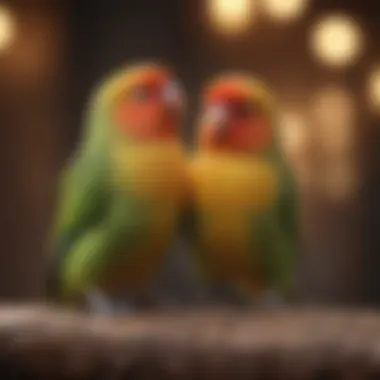

Essential Foods
Providing essential foods defines the nutritional foundation for a pet bird. Most birds require a balanced diet that includes seeds, fruits, vegetables, and pellets. Pellets are often viewed as a reliable choice because they contain all necessary nutrients.
- Variety is key: Offering a mix of food types prevents boredom and ensures comprehensive nutrition.
- Natural sources: Fresh fruits and vegetables contribute to hydration and overall health.
The unique feature of essential foods is their ability to enhance birds' immune systems, boosting their health and lifespan.
Avoiding Toxic Foods
It's important to recognize which foods can harm birds. About the key characteristic of avoiding toxic foods, certain items like avocado, chocolate, and caffeine can be dangerous.
- Awareness is essential: Educating oneself about toxic substances helps prevent accidental ingestion.
- Potential effects: Consuming toxic foods may lead to severe health issues or even death.
By focusing on avoiding toxic foods, owners can safeguard their pets and allow them a longer, happier life.
Health and Hygiene
Regular Vet Check-ups
Regular vet check-ups are instrumental in maintaining a pet bird's health. Routine visits allow for early detection of potential health issues before they escalate. Avian veterinarians can provide invaluable insights into a bird's unique needs.
- Preventative care: Regular exams can include vaccinations and diagnostics that catch problems early.
- Owner guidance: Vets can also advise on diet, behavior, and environmental needs, assisting owners.
The unique feature of regular check-ups is their proactive approach to health; they prepare owners to manage their bird's well-being more effectively.
Signs of Illness
Recognizing signs of illness is crucial for prompt intervention. Birds often hide their discomfort, making observation essential. Some common signs include changes in vocalization, decreased appetite, and feather plucking.
- Behavioral indicators: Any shifts in behavior should raise concern. Birds may become more withdrawn or aggressive when unwell.
- Physical signs: Visible symptoms like fluffed feathers or difficulty in breathing require urgent attention.
Being familiar with signs of illness empowers owners to act fast, ensuring their birds remain healthy and vibrant companions.
Behavioral Insights
Understanding the behavioral insights of pet birds is essential for anyone considering avian companionship. Birds possess unique behaviors that can reflect their well-being and satisfaction in captivity. By observing these behavioral patterns, owners can ensure their feathered friends remain happy and healthy.
The study of bird behaviors helps in setting an environment that mimics their natural habitat as closely as possible. This insight allows potential and current bird owners to address the specific needs their pets have. Understanding their behaviors leads to better care practices, resulting in reduced stress and improved quality of life for the birds.
Understanding Bird Behavior
Birds have complex behaviors shaped by their instincts and the environments they are accustomed to. Each species exhibits a range of natural behaviors that can include singing, foraging, and social interaction.
Key Elements of Bird Behavior:
- Vocalization: Birds communicate through sounds. Each species has its own set of calls and songs, which can indicate different needs or emotions.
- Foraging: This behavior is not just about finding food. Foraging techniques are crucial for birds to stay mentally stimulated. Offering a variety of foods hidden in different places can encourage this natural instinct.
- Grooming: Birds spend a significant amount of time preening. This is vital for their feather maintenance and overall health, preventing issues like feather plucking.
Understanding these behaviors helps owners interpret what their birds may need or want.
Social Needs
Social interaction is crucial for pet birds. Most species thrive on social engagement, be it with humans or other birds. A lack of social contact can lead to behavioral issues such as anxiety or depression in birds.
Social Needs Analysis:

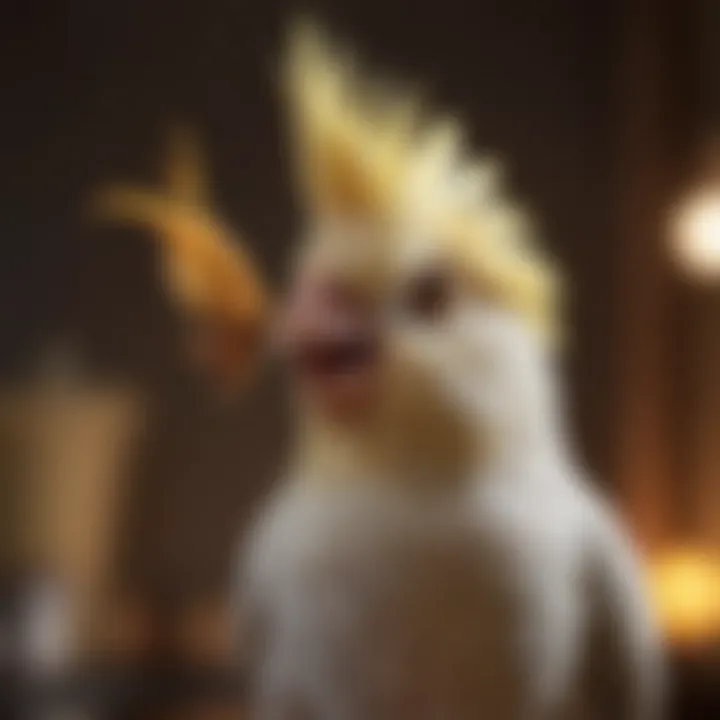
- Interaction with Humans: Many birds enjoy spending time with their owners. Regular interaction through talking or training can enhance their bonding and lead to a more satisfied pet.
- Cohabitation: For those with multiple birds, it is important to monitor their interactions to ensure compatibility. Some species are more social than others and prefer the company of their own kind.
- Environmental Enrichment: Incorporating various activities and toys can simulate social interactions. For instance, swings or mirrors can keep birds occupied and engaged.
"Fulfilling a bird's social needs is essential; it impacts their mental health and behavior directly."
Environmental Considerations
Environmental considerations play a pivotal role in ensuring the welfare of pet birds. Birds are sensitive creatures influenced by their surroundings. An understanding of these elements can greatly enhance their quality of life. This section aims to guide bird owners in creating optimal living conditions for their avian companions.
Creating a Bird-Friendly Space
Creating a bird-friendly space is crucial for both physical and psychological well-being of pet birds. Start by selecting an appropriate cage. The cage should be spacious enough for the bird to move freely, flap its wings, and play. Proper ventilation is also a must. Natural light helps with their circadian rhythms, but avoid direct sunlight that might overheat them.
When arranging the cage, consider the following:
- Perches: Use a variety of perch sizes and materials. This promotes foot health and prevents boredom.
- Toys: Birds need mental stimulation. Rotate toys regularly and provide different textures and sounds.
- Clutter: While it's tempting to fill the cage with items, maintain enough space for the bird to fly short distances.
A well-thought-out environment can prevent stress and encourage natural behaviors. Some owners also create play areas outside the cage where birds can explore safely.
Safety Precautions
Safety is paramount in the care of pet birds. Birds are inquisitive and can easily get into dangerous situations if proper precautions are not taken. Here are key safety measures to consider:
- Toxic Plants: Many common houseplants are toxic to birds. Research which plants are safe. Avoid keeping any known toxic plants, such as pothos and philodendrons.
- Hazardous Items: Ensure that small objects, such as batteries or coins, are out of reach. Birds can easily swallow them, leading to serious health issues.
- Temperature Control: Birds thrive in temperatures ranging from 18°C to 25°C. Avoid placing cages near drafts or heating vents.
- Air Quality: Birds are sensitive to fumes. Avoid cooking with non-stick pans, as they can emit fumes harmful to birds. Also, refrain from using aerosols or scented candles in their vicinity.
Remember: Regularly inspect the bird's environment for potential hazards to ensure a safe living space.
Ethical Considerations in Bird Ownership
When considering pet birds, it is crucial to understand the ethical implications involved in ownership. Birds are not simple objects or toys; they are living beings that require specific care and attention. Responsible bird ownership embodies recognizing the emotional and physical needs of these creatures. It also encompasses understanding how our decisions regarding sourcing them impact their welfare and future.
Adoption vs. Purchase
The first ethical consideration to highlight is the choice between adopting a bird from a shelter and purchasing one from a pet store or breeder. Adopting a bird can provide a second chance for an animal that may not have a home. Shelters often have various species, including those that may be less common in pet stores. These birds may come with unique histories.
- Benefits of Adoption:
- Reduces the number of homeless birds.
- Supports animal welfare organizations.
- Often includes initial veterinary care or assessments.
On the contrary, purchasing a bird usually ensures you know its history and health status from the start. However, it is essential to consider the source of the bird. Not all breeding practices are ethical, and purchasing from irresponsible breeders may contribute to problems such as habitat depletion and the proliferation of poorly cared-for birds. Choosing to adopt, when possible, often aligns better with ethical consideration.
Responsible Breeding Practices
If one decides to purchase a bird, it is imperative to support responsible breeding practices. Ethical breeders prioritize the health and well-being of their birds. They maintain standards that ensure birds are not only healthy but also socialized appropriately for their future homes.
Responsible breeders typically:
- Provide spacious and clean living conditions for their birds.
- Maintain proper breeding practices that do not harm the health of the mother or offspring.
- Limit the number of birds they breed to prevent overpopulation.
- Offer lifelong support and guidance to new bird owners, ensuring that the bird can adapt well to their new environment.
The End
The significance of concluding an article on the best pet birds in India cannot be overstated. This section encapsulates the essence of the information presented, summarizing key insights and encouraging responsible bird ownership. Prospective owners must be aware of the broader implications of their choices when selecting a pet bird. The responsibility of caring for avian companions extends beyond mere ownership; it involves a commitment to understanding their needs, behaviors, and overall well-being.
The Future of Pet Bird Ownership
As we look to the future of pet bird ownership in India, several critical elements come into play. The landscape of avian companionship is evolving, shaped by increasing awareness of the ethical and environmental considerations surrounding pet ownership. Here are some pivotal trends and considerations:
- Adoption Initiatives: There is a growing movement towards adopting birds from shelters and rescue organizations rather than purchasing them from pet shops. This trend not only saves lives but also helps mitigate the problems associated with irresponsible breeding.
- Education and Awareness: With more resources available online and through community programs, bird owners can access valuable information about caring for their pets. As knowledge spreads, owners can create more enriching environments for their birds.
- Regulations and Standards: Governments may impose stricter regulations on bird breeding and sales to promote responsible practices. This shift will likely lead to a more standardized approach to bird care and welfare.
"Embracing ethical practices and making informed choices can lead to a more sustainable future for pet bird ownership."
- Technological Innovations: Advances in technology, such as smart feeders and app-based monitoring systems, will help owners better manage their birds’ diets and health, ensuring their well-being.
In summary, the future of pet bird ownership in India appears promising, driven by a collective shift towards responsibility, education, and ethical practices. As potential bird owners, it is essential to consider these elements and to approach bird companionship with the philosophy of care, commitment, and respect. By doing so, bird owners can foster a thriving environment for their feathered friends.















